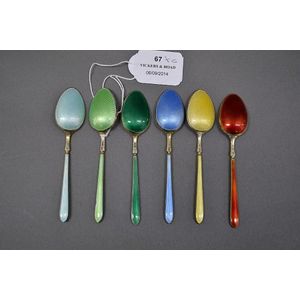Christofle Sterling Silver Flatware Set in Mahogany Chest
You must be a subscriber, and be logged in to view price and dealer details.
Subscribe Now to view actual auction price for this item
When you subscribe, you have the option of setting the currency in which to display prices to $Au, $US, $NZ or Stg.
- Flatware - An alternative name for items of cutlery, principally knives, forks and spoons, now generally used to describe sets of these implements. Nowadays it is mostly used when describing cutlery made of silver and silver plate.
It is less frequently used to describe all "flat' items of tableware, so that as well as cutlery the definition includes plates. - Sterling Silver - Sterling silver is a mixture of 92.5% pure silver and 7.5% of another metal, usually copper. Fine silver is 99.9% pure silver, and is relatively soft and the addition of the very small amount of copper gives the metal enough strength and hardness to be worked into jewellery, decorative and household objects.
- Regency Period - The Regency period in English furniture design refers to the period when King George III, was declared unfit to rule in 1811, and his son ruled as proxy as Prince Regent, until 1820, and then, after the death of his father as George IV until his death in 1830. The Regency period was preceded by the Georgian period (George I, George II, and George III: 1714 - 1811), and was followed by the William IV period, which only lasted until 1837 when William IV died as was succeeded by Queen Victoria.
- Circa - A Latin term meaning 'about', often used in the antique trade to give an approximate date for the piece, usually considered to be five years on either side of the circa year. Thus, circa 1900 means the piece was made about 1900, probably between 1895 and 1905. The expression is sometimes abbreviated to c.1900.
- Mahogany - Mahogany is a dense, close grained red-coloured timber from the West Indies and Central America. It was first imported into Europe in the the early 18th century and its use continued through the 19th century. It was popular for furniture making because of its strength, the wide boards available, the distinctive grain on some boards, termed flame mahogany and the rich warm colour of the timber when it was polished.. The "flame" was produced where a limb grew out from the trunk of the tree, and this timber was usually sliced into veneers for feature panels on doors, backs and cornices.
Some terms used to describe mahogany relate to the country from which it originally came, such as "Cuban" mahogany, "Honduras" mahogany etc. However unless the wood has been tested the names assigned are more a selling feature, rather than a true indication of the timber's origin. - Marrow Spoon - A spoon with a long handle and a narrow scoop shaped bowl, used to scoop and eat marrow from the hollow centre of roasted bones. Some marrow scoops are double ended with a different shaped bowl at each end.
This item has been included into following indexes:
- butter knife / knives - silver items 190
- Christofle (France)
Visually similar items

A comprehensive Italian 800 silver cutlery service, comprising minimum setting for 12, 12 x fish dinner and starter knifes, 24 x dinner forks, 12 x cake forks, 12 x fish forks, 24 x tea spoons, 22 coffee spoons, 12 x glace spoons, 2 x serving spoons a ladl

A Georg Jensen sterling silver cutlery setting, Cactus pattern, designed by Gundolph Alertus in 1930 comprising: twelve large knives, twelve entree knives, twelve soup spoons, twelve large forks, twelve entree forks, twelve dessert spoons, six fruit knives

Six sterling silver gilt and enamel coffee spoons, Birmingham (6)

Georg Jensen Tuja pattern 182 piece flatware set, design by Magnus Stephensen, in good used condition, marked Georg Jensen, other notes, comprising, 26 table knives, 19 entree knives, 22 butter knives, 17 table forks, 14 entree forks, 18 fish forks, 8 cake
